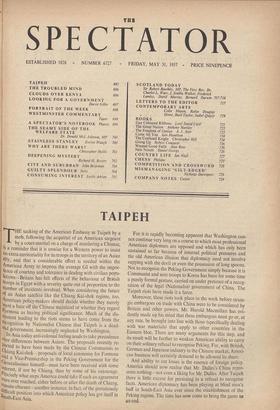TAIPEH
HE sacking of the American Embassy at Taipeh by a mob, following the acquittal of an American sergeant by a court-martial on a charge of murdering a Chinese, is a reminder that it is unwise for a Western power to insist on extra-territoriality for its troops in the territory of an Asian ally, and that a considerable effort is needed within the American Army to impress the average GI with the impor- tance of courtesy and tolerance in dealing with civilian popu- lations—Britain has felt effects of the behaviour of British troops in Egypt with a severity quite out of proportion to the number of incidents involved. When considering the future of an Asian satellite like the Chiang Kai-shek regime, too, American policy-makers should decide whether they merely Want a base off the Chinese mainland or whether they regard Formosa as having pOlitical significance. Much of the dis- content leading to the riots seems to have come from the recognition by Nationalist Chinese that Taipeh is a dead- end government, increasingly neglected by Washington.
In Asia today anti-colonial feeling tends to take precedence Over differences between Asians. The proposals recently re- Ported to have been made by the Chinese Communists to Chiang Kai-shek--proposals of local autonomy for Formosa and a Vice-Premiership in the Peking Government for the 9eneralissimo himself—must have been received with some Interest, if not by Chiang, then by some of his entourage. Precisely what steps America could take if such an agreement Were ever reached, either before or after the death of Chiang, remain obscure—another instance, in fact, of the gratuitously difficult position into which American policy has got itself in South-East Asia. For it is rapidly becoming apparent that Washington can- not continue very long on a course to which most professional American diplomats are opposed and which has only been sustained so far because of internal, political pressures and the old American illusion that diplomacy need not involve supping with the devil or even the possession of long spoons. Not to recognise the Peking Government simply because it is Communist and sent troops to Korea has been for some time a purely formal gesture, carried on under pretence of a recog- nition of the legal (Nationalist) government of China. The Taipeh riots have made it a farce.
Moreover, these riots took place in the week before strate- gic embargoes on trade with China were to be considered by Britain and other powers. Mr. Harold Macmillan has evi- dently made up his mind that these embargoes must go or, at any rate, be brought into line with those (specifically dealing with war materials) that apply to other countries in the Eastern bloc. There are many arguments for this step, and its result will be further to weaken American ability to carry on their solitary refusal to recognise Peking. For, with British, German and Japanese industry in the Chinese market, Ameri- can business will certainly demand to be allowed its share.
And ability to cut losses is the essence of foreign policy. America should now realise that Mr. Dulles's China repre- sents nothing—not even a liking for Mr. Dulles. After Taipeh there is little excuse for persisting in a refusal to recognise facts. American diplomacy has been playing at blind man's buff in South-East Asia ever since the establishment of the Peking regime. The time has now come to bring the game to an end.










































 Previous page
Previous page